Rhodes V8 group comparison: Is Rhodes’ first plugin the only emulation you’ll ever need?
Rhodes has released its first ever virtual instrument and it’s considerably more affordable than the company’s £8,000 hardware model. So how does it stack up against the competition?
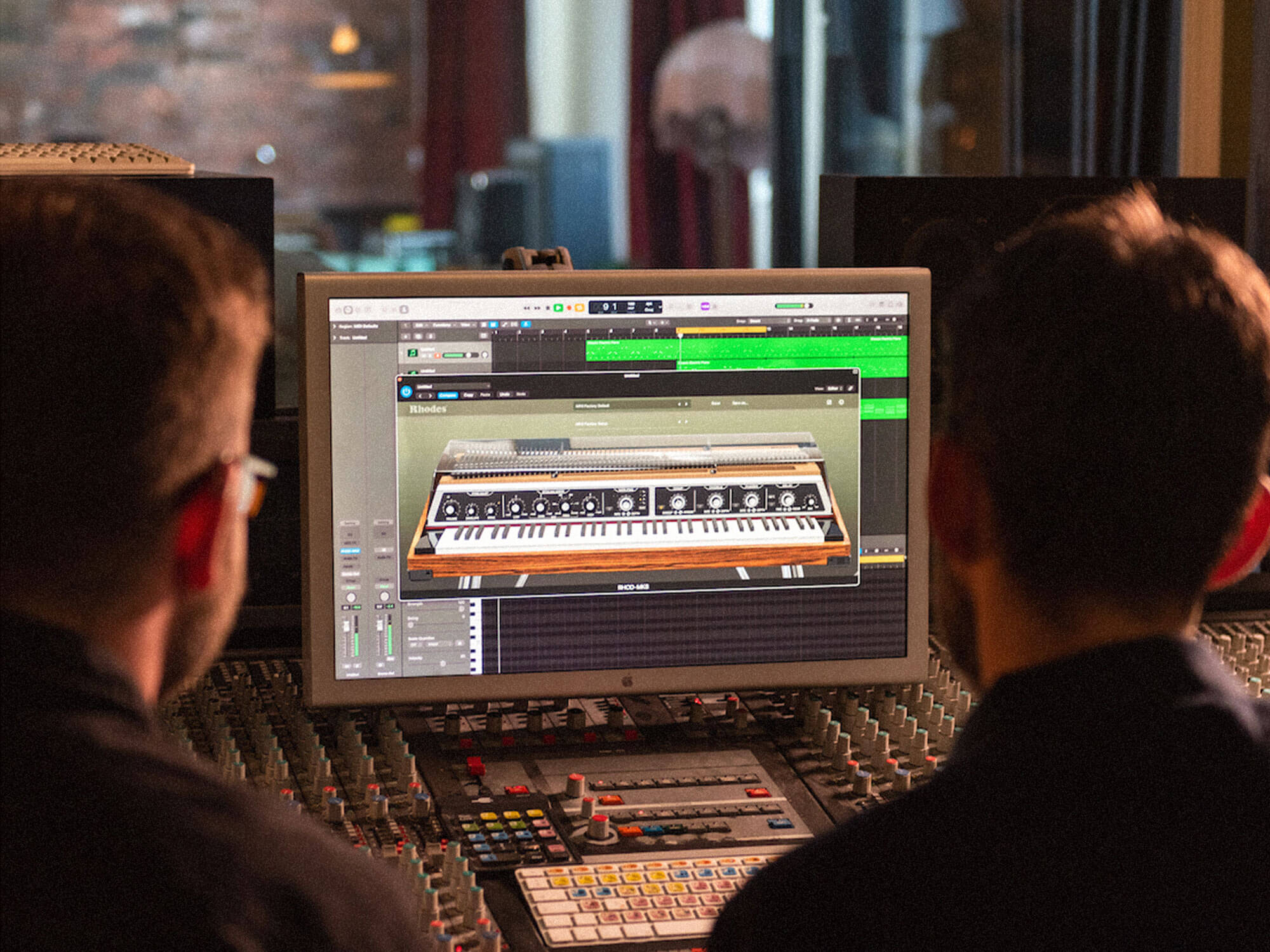
The Rhodes electromechanical piano was created in the late 1960s by Harold Rhodes, initially in partnership with Leo Fender. In that pre-digital age, moving keyboard instruments from venue to venue was impractical, since they were either conventional pianos or hefty beasts like Hammond organs with Leslie speakers. The Rhodes, though itself a serious piece of furniture, was designed to be more portable. Far more importantly, however, it had a unique sound that would quickly come to be a staple of jazz, rock and pop music. Entirely analogue, it could be tuned and tweaked relatively easily and was incredibly responsive to different playing styles.
Alongside the release of Rhodes’ brand new Mk8 Rhodes piano, the revived company has released an official plugin version for the many players who won’t be able to stretch to the £8,000 asking price of the jaw-dropping hardware. Though other Rhodes emulations exist, this is the first one created by the company and, as such, is turning heads.
The Rhodes V8 comes in all major plugin formats (though there’s currently no standalone app) and weighs in at 20GB, which isn’t unusual for a modern, high-quality sampled instrument. In fact, there are 30,000 samples of the MK8 hardware taken at 100 velocity layers – figures that won’t be a surprise to players who know how much a Rhodes’ sound changes depending on how you play a key.
The front panel almost exactly mirrors that of the hardware, with large dials to control volume, EQ and effects. There’s Preamp with an envelope and drive, a three-band EQ, a panner to replicate the classic Fender Twin amp effect, and then compression, chorus, phaser and delay with amount, rate, mix and depth controls as appropriate.
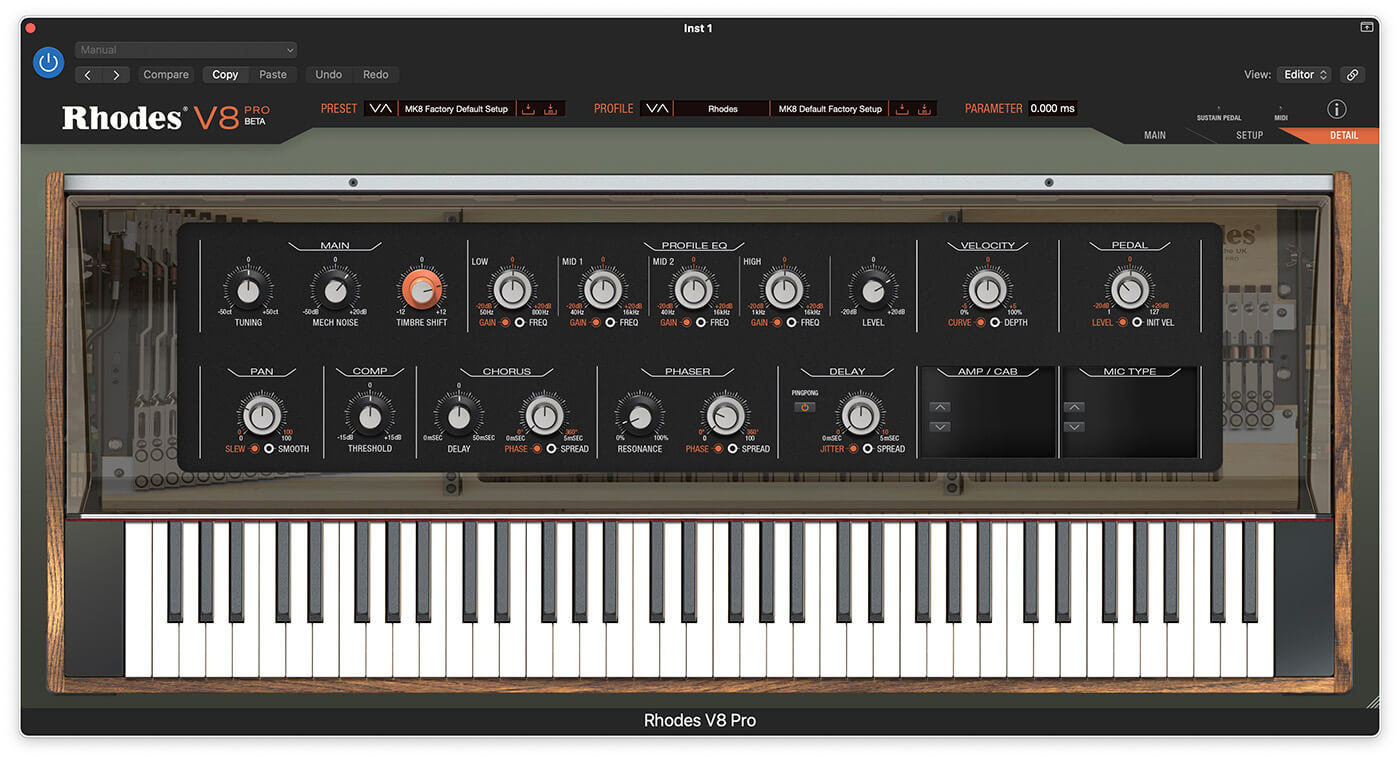
Click into the Detail section and you can access more in-depth settings starting with master tuning and variable mechanical noise. Then there’s a dial called Timbre Shift that lets you control the shift between softer and more mellow, and more biting and hard-edged feels across the instrument. Each of the effects has additional settings in this section as does EQ and you’ll also find variable controls for velocity and pedal behaviour. Finally, there are switchable amp setups with four classic amps and cabs plus two mics to choose from.
The Setup section provides a beautifully implemented system for changing the sound of each tine or note in a way that replicates but also expands on how you’d do it on a real Rhodes. The four colour-coded sections control timbre, fine tuning, damper and level for each note and let you set them individually or draw ramps across several notes. So you can give certain notes or ranges plenty of bite for example, while leaving others softer. Of course, you can leave these untouched for a more classic and uniform sound, but it’s an excellent feature and lets you tailor the character in a way that wasn’t possible on the original models.
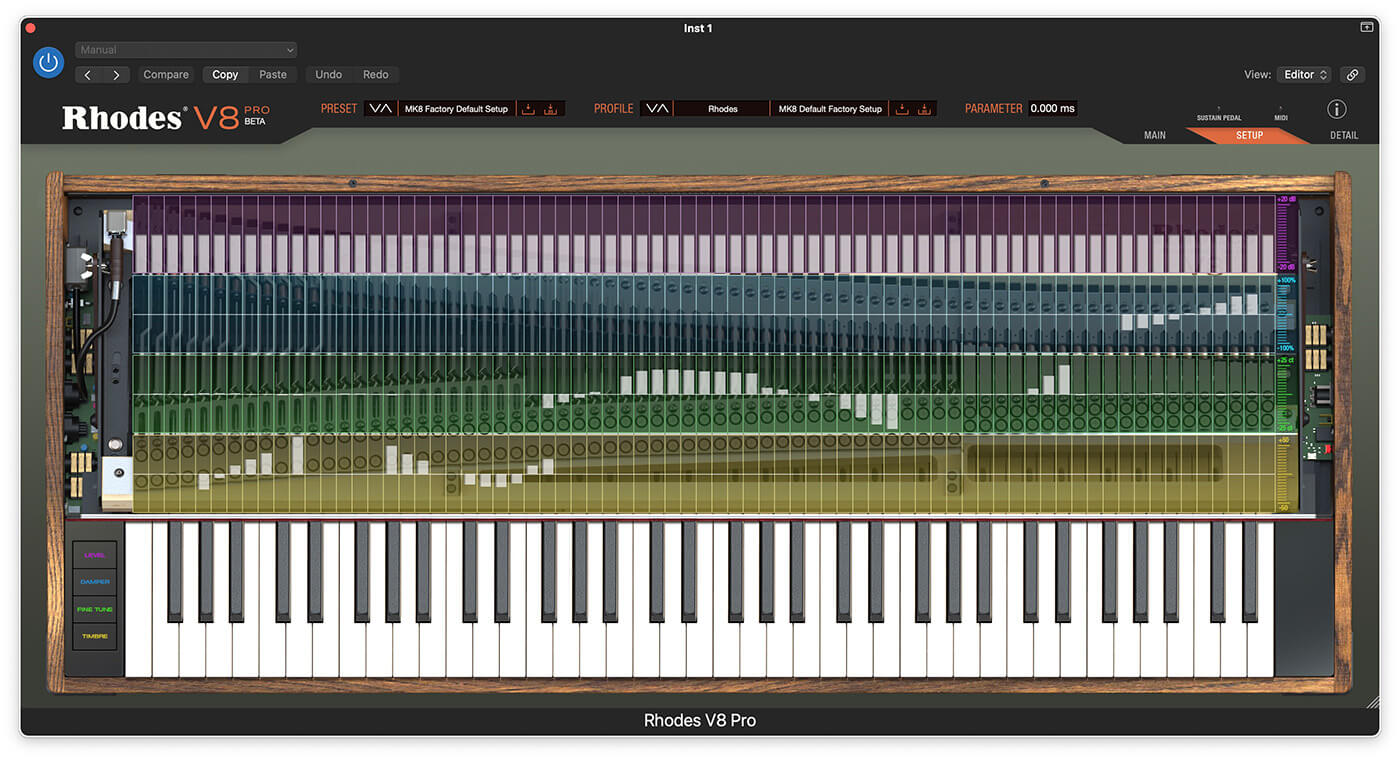
It’s worth mentioning the difference between the standard and Pro versions. To the core features of the standard edition, the Pro adds envelope-controlled effects like wah, plus compressor, chorus, phaser and delay effects and a selection of mics and amps. You also get the per-note setup controls as mentioned above, whereas the standard version’s options here are more basic.
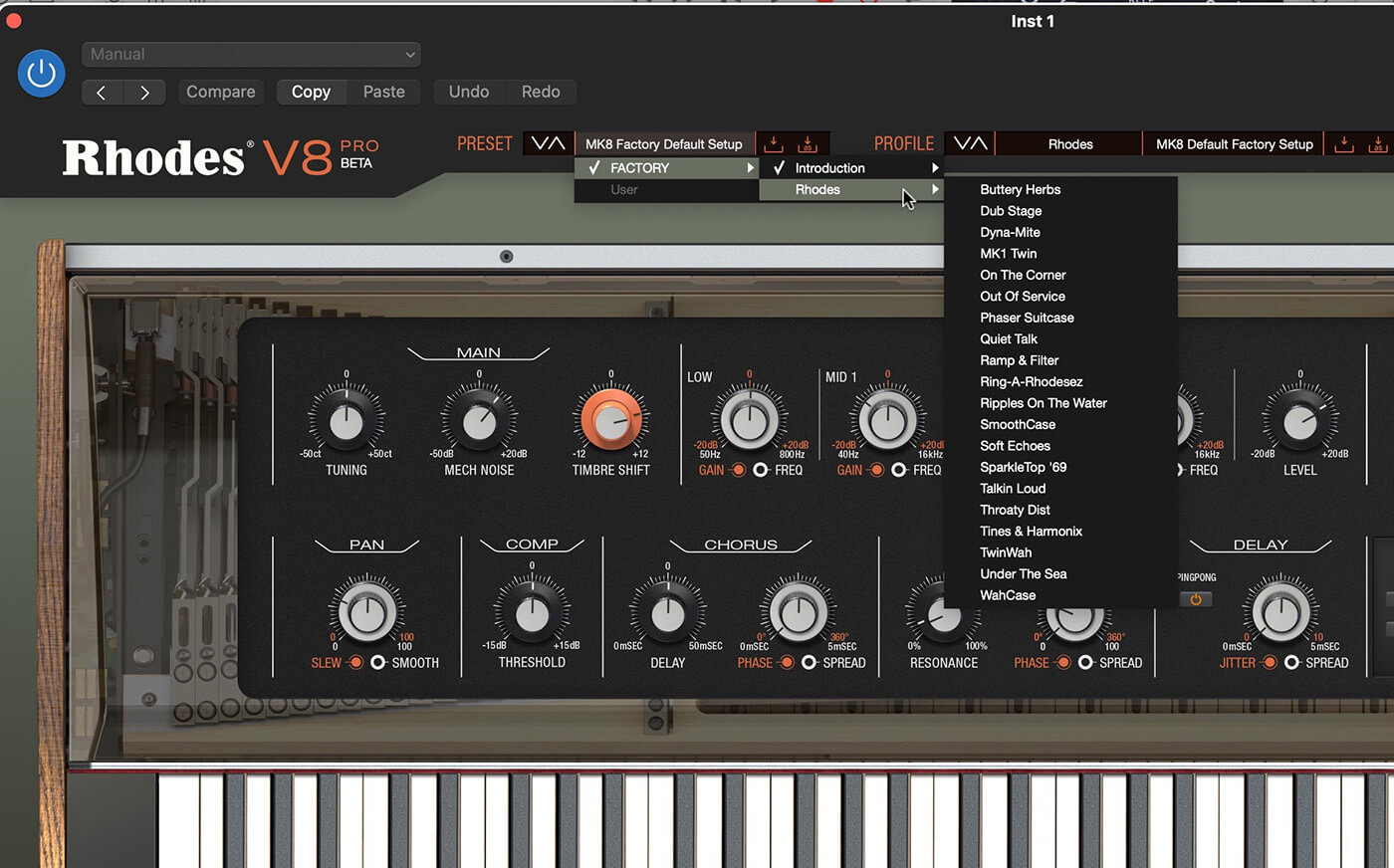
The V8 is beautifully designed. It’s preloaded with factory presets and profiles with more artist profiles to be added in future updates; these cover styles from dry and hard to the truly spaced out. If you prefer your Rhodes sounds more classic than psychedelic, you’ll appreciate the detailed multisampling that responds to different playing techniques with varying levels of bite.
The rich selection of effects is perfectly suited to creating a spectrum of Rhodes sounds (there’s no reverb, oddly), and it’s a joy to play. It’s a shame there’s no standalone version but that could be introduced in time. Serious Rhodes fans should definitely consider the Pro version over the standard since it adds more effects taken from the MK8, as well as amp and mic simulations and, crucially, the per-note setup that truly elevates this instrument above its competitors.
Price
Rhodes V8
£149.95 / $179.95 / €169.95
Rhodes V8 Pro
£249.95 / $299.95 / €274.95
Contact Rhodes
Competitors
Arturia Stage-73 V
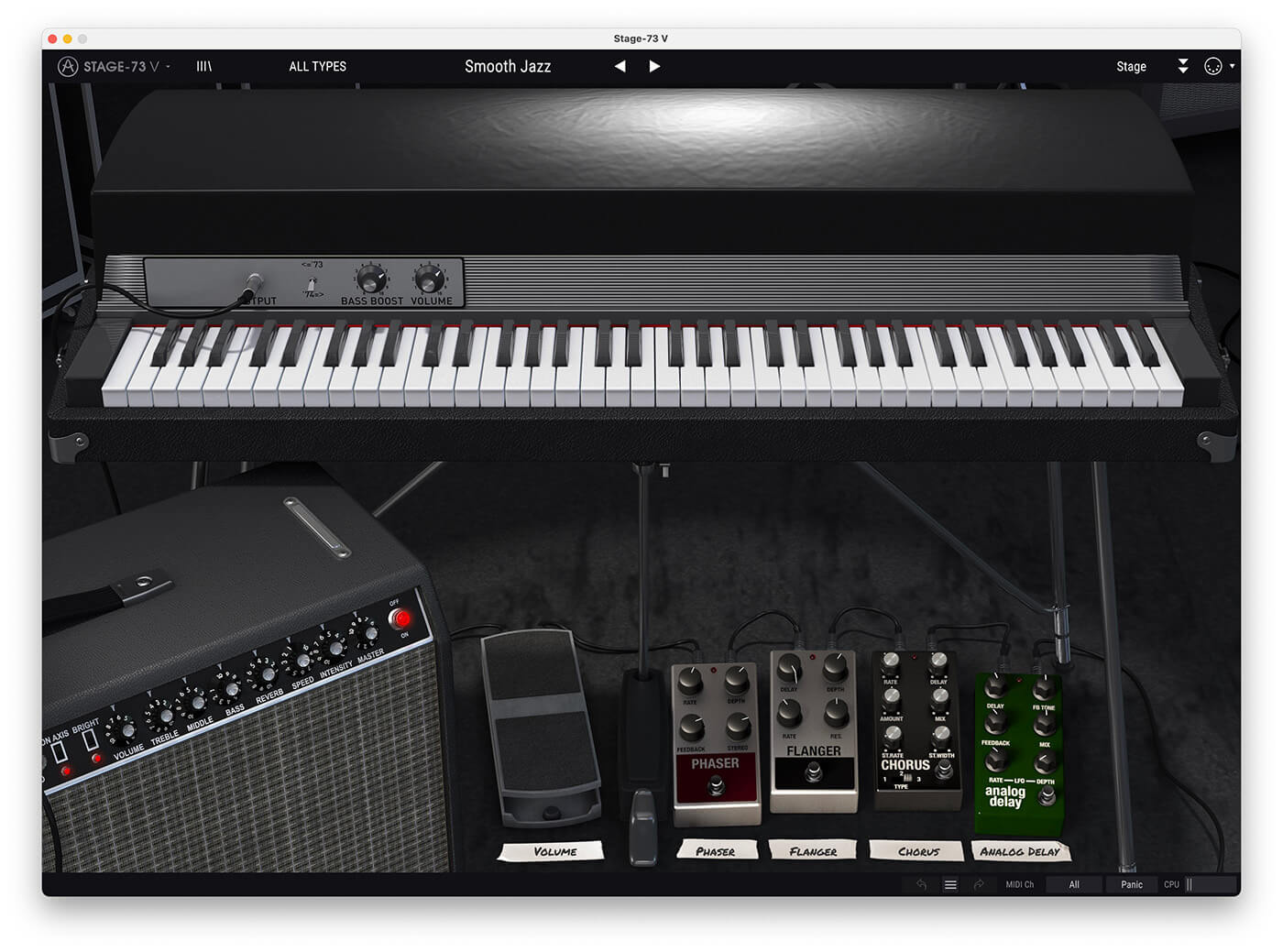
The Stage-73 V presents you with a virtual hardware setup consisting of your Rhodes – Stage and Suitcase models are available – plus a selection of stomp boxes, a wah pedal and a small choice of amps. Almost everything is clickable here so you can pick up dials and sliders anywhere or map them to MIDI controllers for realtime control. There are a bunch of presets that cover a lot of bases and the instrument works as a plugin or standalone app.
While it lacks the per-note editability of the V8, the Stage-73 V does let you get under the hood of the keyboard where you can choose from a range of profiles to set the way the instrument responds to playing. Though they are global controls, you do get dials for tone bar resonance, pickup distance, hammer hardness and more alongside an editable velocity curve. It sounds impressive and, though its window can’t be live resized, it can be zoomed in or out to set values to cope with different screen sizes.
Price €149
Native Instruments Session Keys Electric S
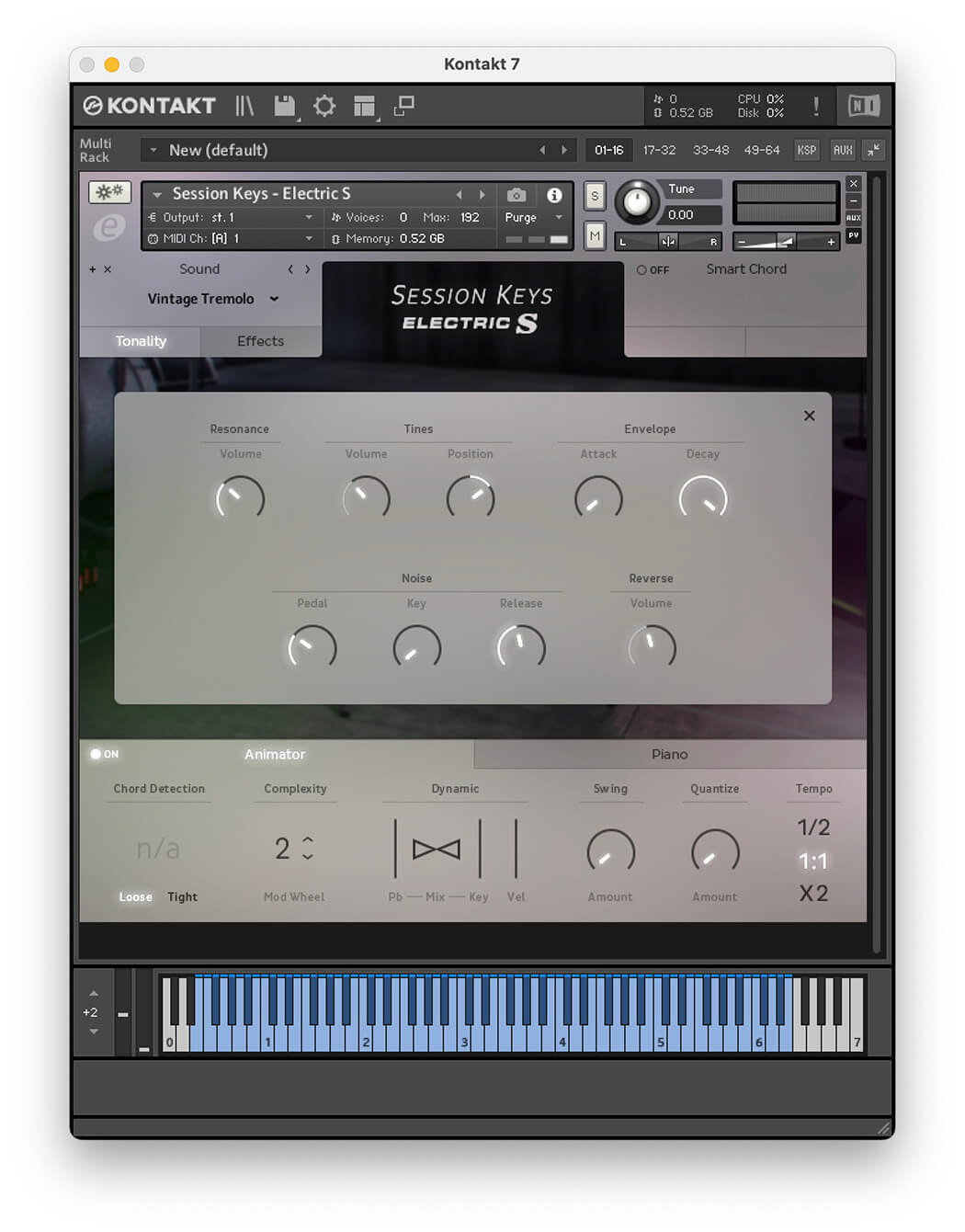
Session Keys Electric S has been around a while and runs in Kontakt – this ensured the developers could access a few extra features than a non-Kontakt instrument might enjoy. There’s less focus here on the piano itself for editing sounds and more on clever tools. So yes, there’s core stuff like dynamics, tonality and a suite of effects (including reverb) but also a ‘pentamorph’ section for morphing between different treatments in real time. Indeed, the effects can be assigned to this pad.
There’s also an animator tool that combines with a chord detector and generator to let you create complex chords and entire patterns from simple note input. These are genuinely useful for less-experienced players and even for seasoned players just in search of some more inspiration. This instrument takes a more scientific and less vibe-based approach to the Rhodes but it’s competitively priced and sounds cool. If all you want to do is play, some of its tools may be overkill for you.
Price £69
Applied Acoustics Lounge Lizard EP-4
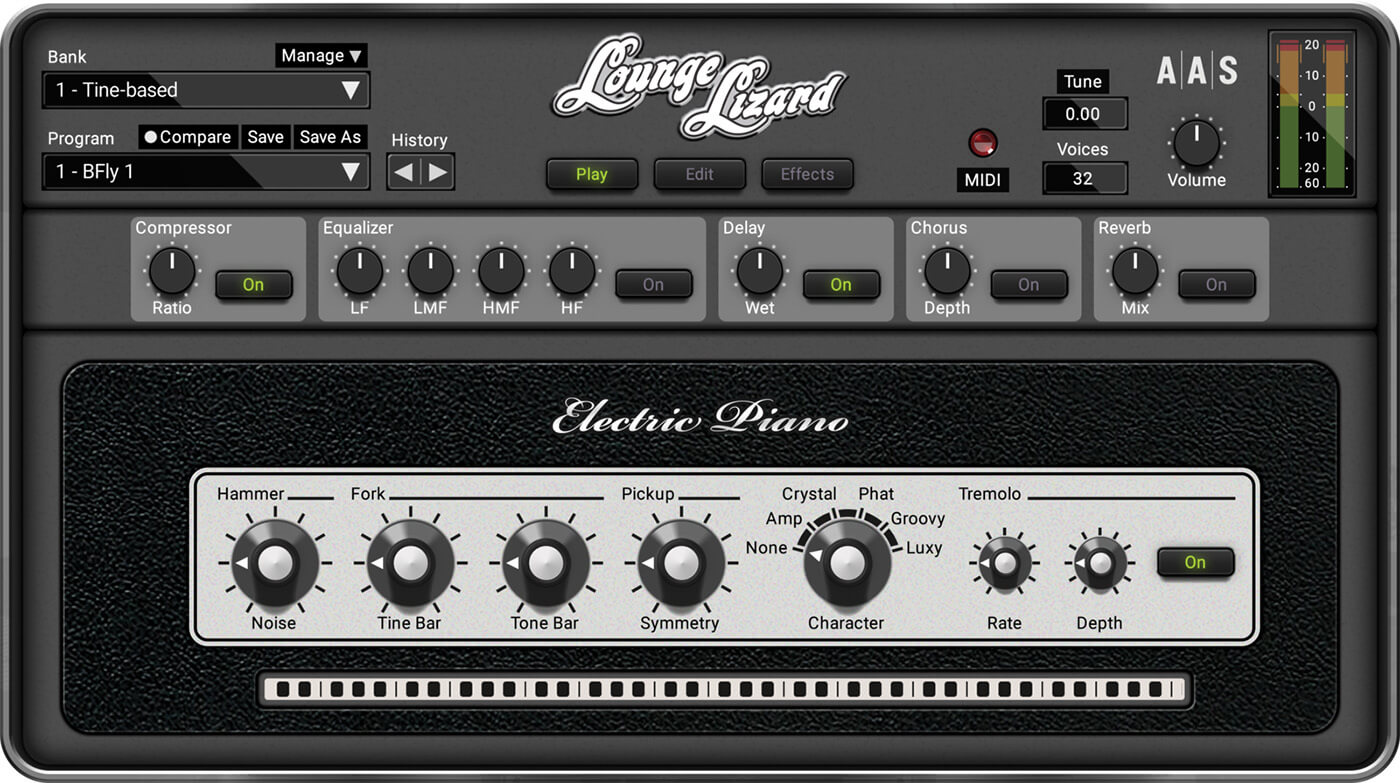
Another long-established virtual electric piano, Applied Acoustics’ Lounge Lizard is based on modelling synthesis rather than samples and therefore has a much smaller memory footprint than most competitors. It also doesn’t spend any time trying to show you a Rhodes, instead favouring a pretty compact design with core controls for hammers, forks, pickups and more easily accessible. There are Play, Edit and Effects screens for various levels of detail when editing, and the whole thing has a very slick and streamlined feel, with a solid selection of presets available.
Sonically, purists may shy away from the concept of modelling and, though it sounds luscious, some may feel it lacks the soul of a multisampled version of a Rhodes. On the other hand, its filesize is far smaller as is its memory use, so it’s a useful alternative to a 20GB+ library sitting on your hard drive. It’s a little costlier than many others, though the Rhodes V8 Pro is still the most expensive version.
Price $199
Native Instruments Scarbee Mk1
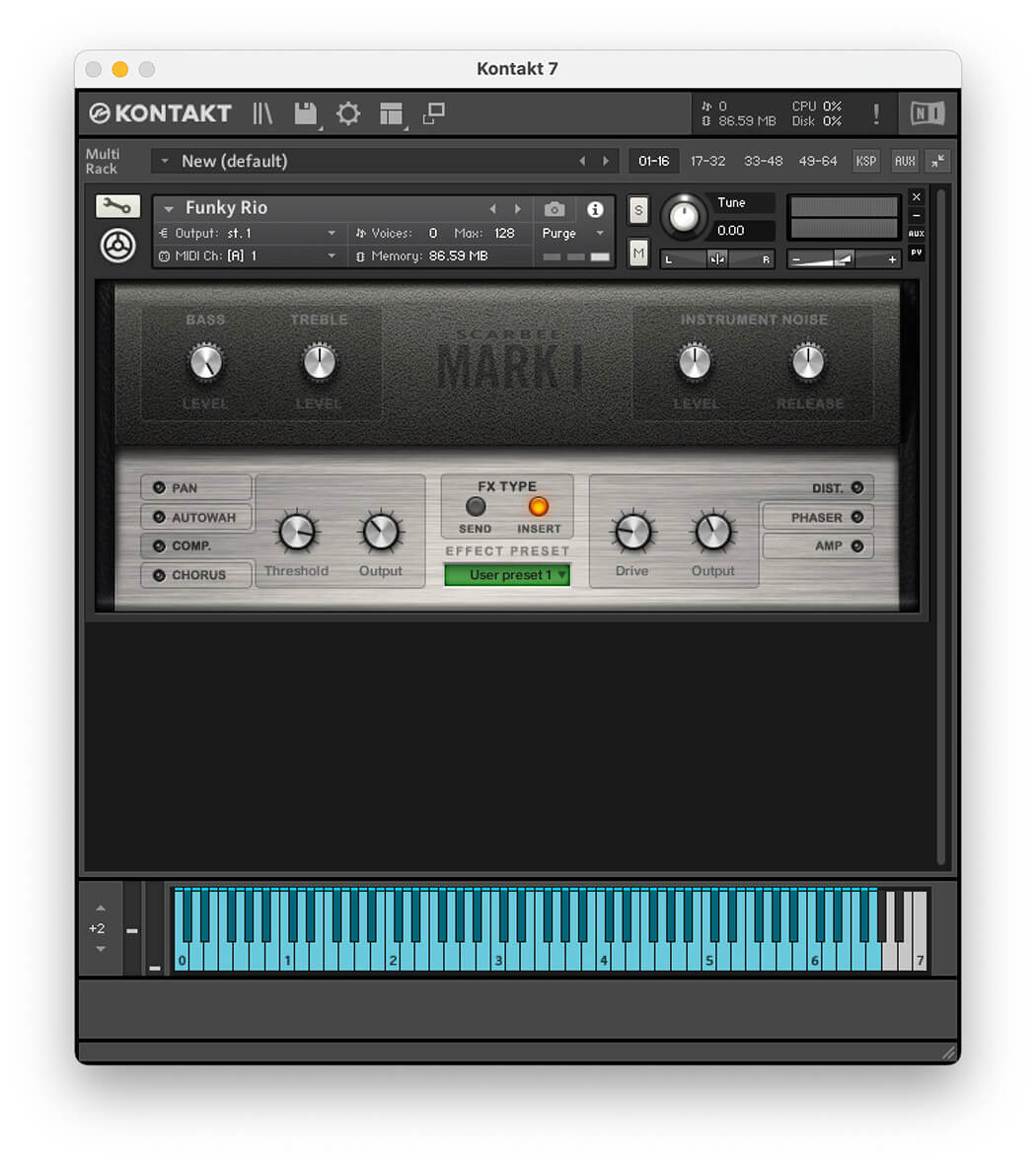
Native Instruments Scarbee is the most affordable we’re looking at and is about as straightforward as these instruments get. Loading in Kontakt Player, you get two simple sections. The first consists of bass and treble and instrument noise controls and the second is an effects section with reverb and delay sends with a wider selection of inserts including panning, auto wah, compression, distortion and amplification.
This is an emulation for those who just want to sit down and play rather than getting in-depth with lots of parameters. It sounds perfectly serviceable but lacks the dynamism of newer and more complex Rhodes emulators. On the other hand, it’s supremely affordable and won’t put a strain on your music system.
Price £59
Conclusion
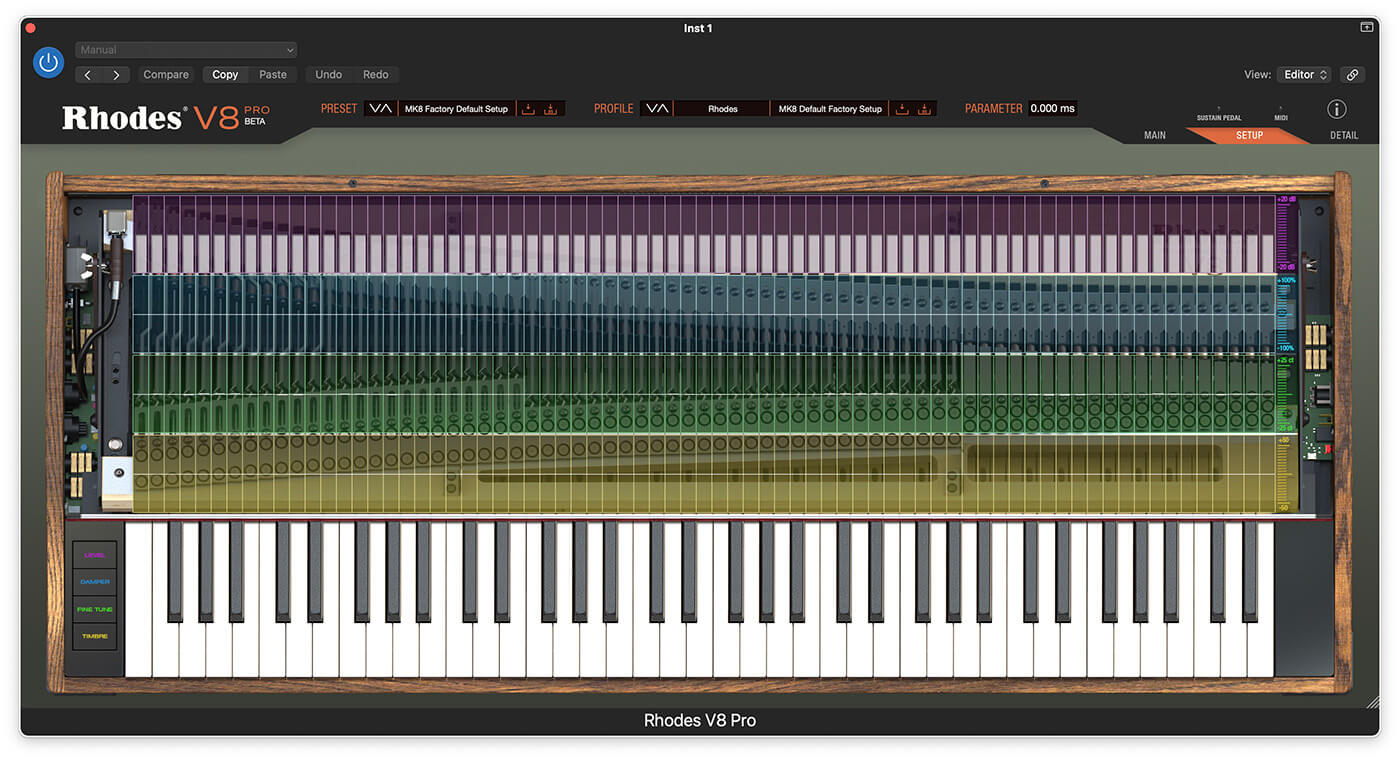
While other virtual Rhodes have relied on sampling existing vintage units or occasionally synthesising sound, the V8 is the only one that can legitimately claim to be developed by the same team who makes the real thing. It’s not a recreation of a classic; it’s a digital version of a new model based on its samples. Rhodes will have done a lot of work designing the MK8 so it’s not surprising that the V8 comes out on top in our shoot-out since the two will almost certainly share a lot of DNA.
Aside from the gorgeous sound and superb playability and responsiveness that it offers, users of the Pro version will love the ability to tweak the timbre and responsiveness of individual notes to create truly custom setups that go way beyond the – still impressive – effects and other sound-shaping tools on offer. It genuinely feels and sounds like the real thing. Arturia’s Stage-73 V is another strong contender with excellent presets and a friendly and flexible layout, while the Session Keys Electric S offers some clever chord and pattern features of its own.
Ultimately however the V8 Pro is as close as most people will get to owning a real Rhodes and for the vast majority, it will be close enough.